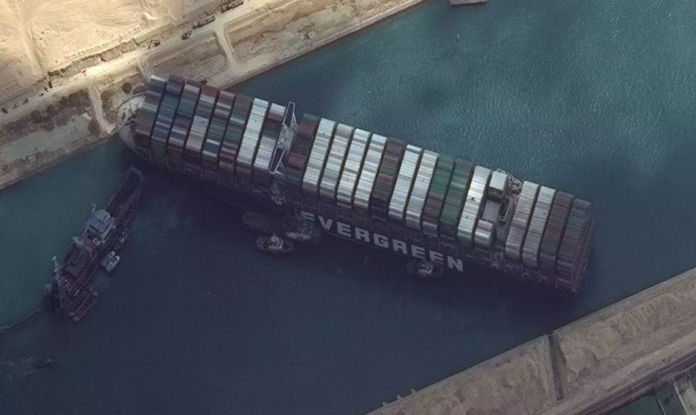LOS ANGELES: A stranded container ship blocking the Suez Canal threatens to make it even more difficult for European and US retailers to keep products in stock during the coronavirus pandemic.
The Suez Canal saga that began on Tuesday and could go on for weeks, is just the latest crisis to strike the global supply chain that was upended when coronavirus shutdowns spurred house-bound consumers to upgrade appliances, sofas, televisions and backyards.
IKEA, the world’s largest furniture seller, and London-based electronics seller Dixons Carphone are among the retailers with goods on the stranded vessel, both companies told Reuters.
Amsterdam-based household goods seller Blokker confirmed they have goods that are being delayed, but would not say what.
The salvage company overseeing the rescue effort has warned it could take weeks to dislodge the massive Ever Given, which got wedged in the canal during a sand storm.
The resulting surge in imports due to the pandemic to Europe and the United States stranded empty containers in the wrong places, drove up cargo rates and caused seaport bottlenecks that are rippling throughout the transportation sector – and threatening to get worse.
“Ships, containers and goods are all in the wrong places,” said Douglas Kent, an executive vice at the Association for Supply Chain Management (ASCM).
Lloyd’s List estimates that roughly $9.6 billion in containerized goods – including exercise equipment, appliances, apparel to consumer electronics – pass through the Suez Canal each day. Thousands of empty containers are also returned to Asian factories via the canal, experts said.
IKEA has about 110 containers on the ship wedged in the canal and is investigating how many boxes of products are on other vessels waiting to enter the channel.
“Depending on how this work proceeds and how long it takes to finish the operation, it may create constraints on our supply chain,” said Hannes Mård, spokesman for IKEA brand owner and franchiser Inter IKEA.
“This is a devastating event in an already stressed market, where high demand has caused congestion delays that keep import cargo from reaching store shelves in a timely fashion,” said Richard Roche, a sub-committee chairman at the National Customs Brokers & Forwarders Association of America.
The risk to container shipping is greatest in Europe – where key seaports like Antwerp in Belgium and Felixstowe in Britain are grappling with backlogs. The United States is exposed to the East and Gulf Coasts. About 45% of cargo volume at the Port of New York & New Jersey moves through the Suez Canal, experts said.
Walmart, which uses seaports in the Southeast and other parts of the country, and its online rival Amazon.com did not immediately respond to comment.
US companies like Nike and Peloton recently made headlines calling out millions of dollars in shipping delay-related costs and product availability disruption. Relief checks from President Joe Biden’s $1.9 trillion coronavirus stimulus package are expected to boost consumer demand and intensify such pressures.
Within days, the race to reroute cargo could be on – pitting retailers against other industries for precious cargo space.
British supply chain procurement partner OCI Limited Group Chief Executive Oliver Chapman said 134 containers of personal protective gear including gloves and masks eventually bound for organizations like England’s National Health Service and New York’s Northwell Health are on nine ships stuck behind the Ever Given.
He said alternative rail service from Asia into Europe is already heavily congested, and flying cargo is prohibitively expensive – increasing the cost of one small box of nitrile gloves from about 25 cents for the sea to $2-$3 for air into Europe.
His group is already rerouting some U.S. cargo to the Port of Los Angeles, which is digging out from under a mountain of cargo.




